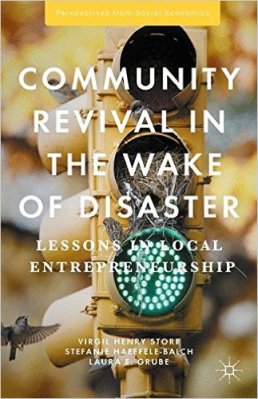
Frank Conway interviewed me over at Economic Rockstar about my work on community responses to Hurricane Katrina and historical natural disasters like the Chicago Fire of 1871. We discuss some of the literature on why states often fail to provide effective relief efforts, some of the bias in federal responses, and how some communities are able to organise from the bottom-up to solve problems on the ground. Our conversation covers not just my work on these topics, but touches on a recent volume published by Virgil Storr, Stephanie Haeffle-Bache and Laura Grube, “Community Revival in the Wake of Disaster“.
The book examines how entrepreneurs in commercial and civil society serve as agents of change in the immediate and ongoing aftermath of disasters. Drawing on extensive interviews and field work, the case studies document how private, decentralised efforts to combat large scale disasters actually unfold.
After almost every natural disaster I have studied, political actors and media are quick to condemn markets and businesses for taking advantage of the situation. The political rhetoric and appeal of price-gouging is powerful. And on face value, it’s easy to see why. When prices are doing their job after disaster, they rise – indicating what resources are needed, the intensity of those needs, and incentivising producers to meet those needs quickly. But all too often the political cheap talk masks how markets, firms, and civil society actually bring about successful recovery efforts.

Comments are closed.